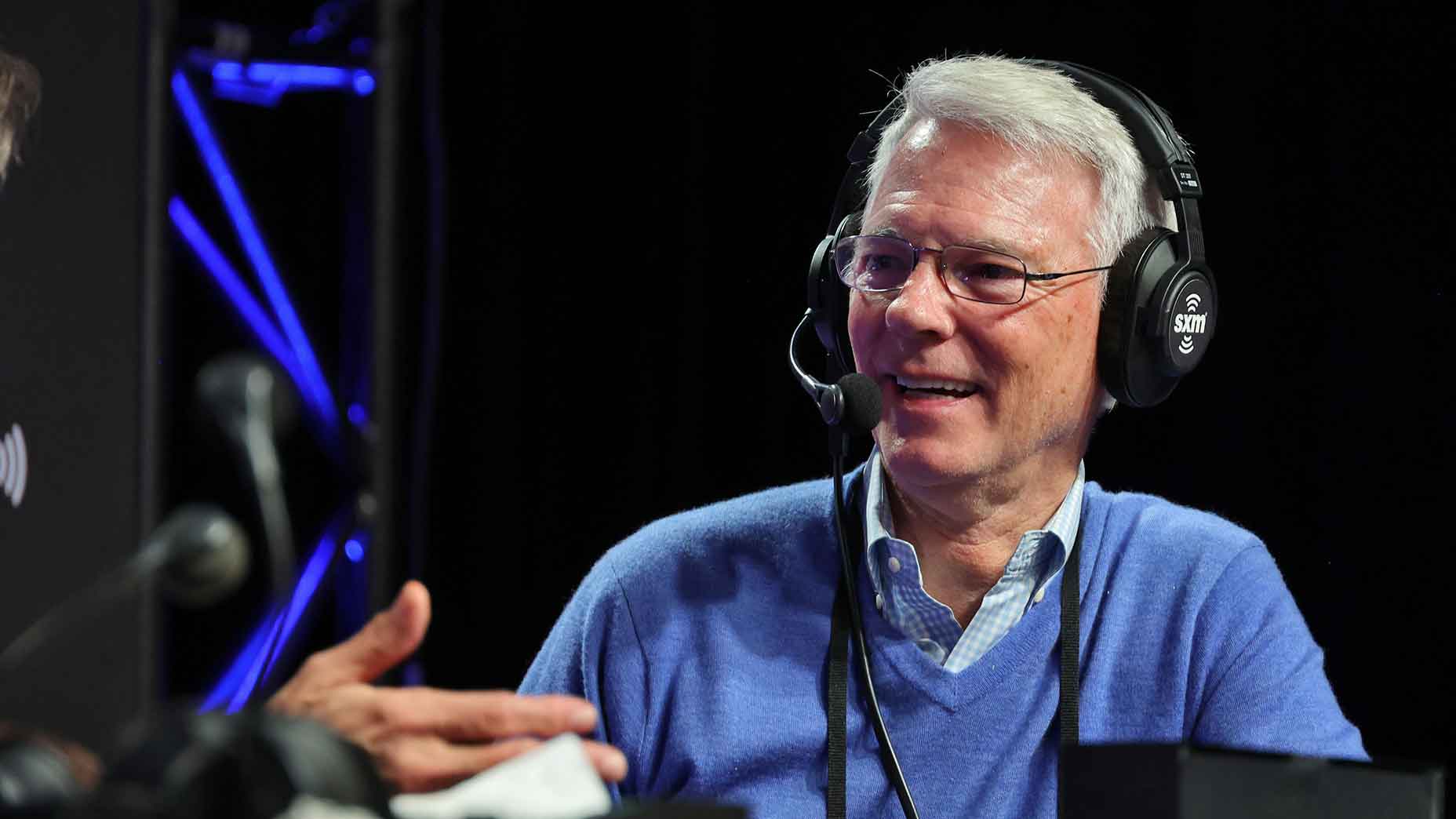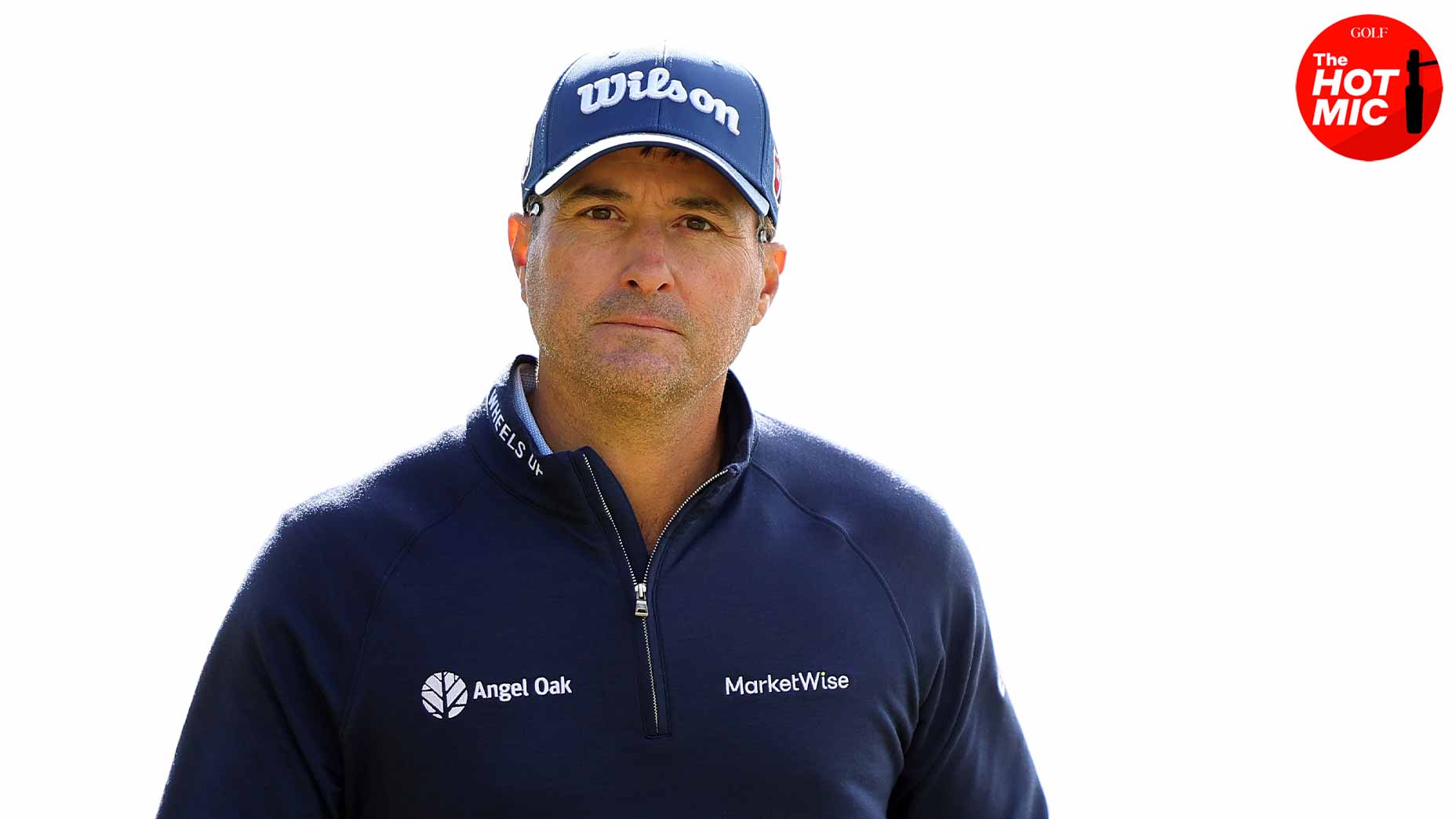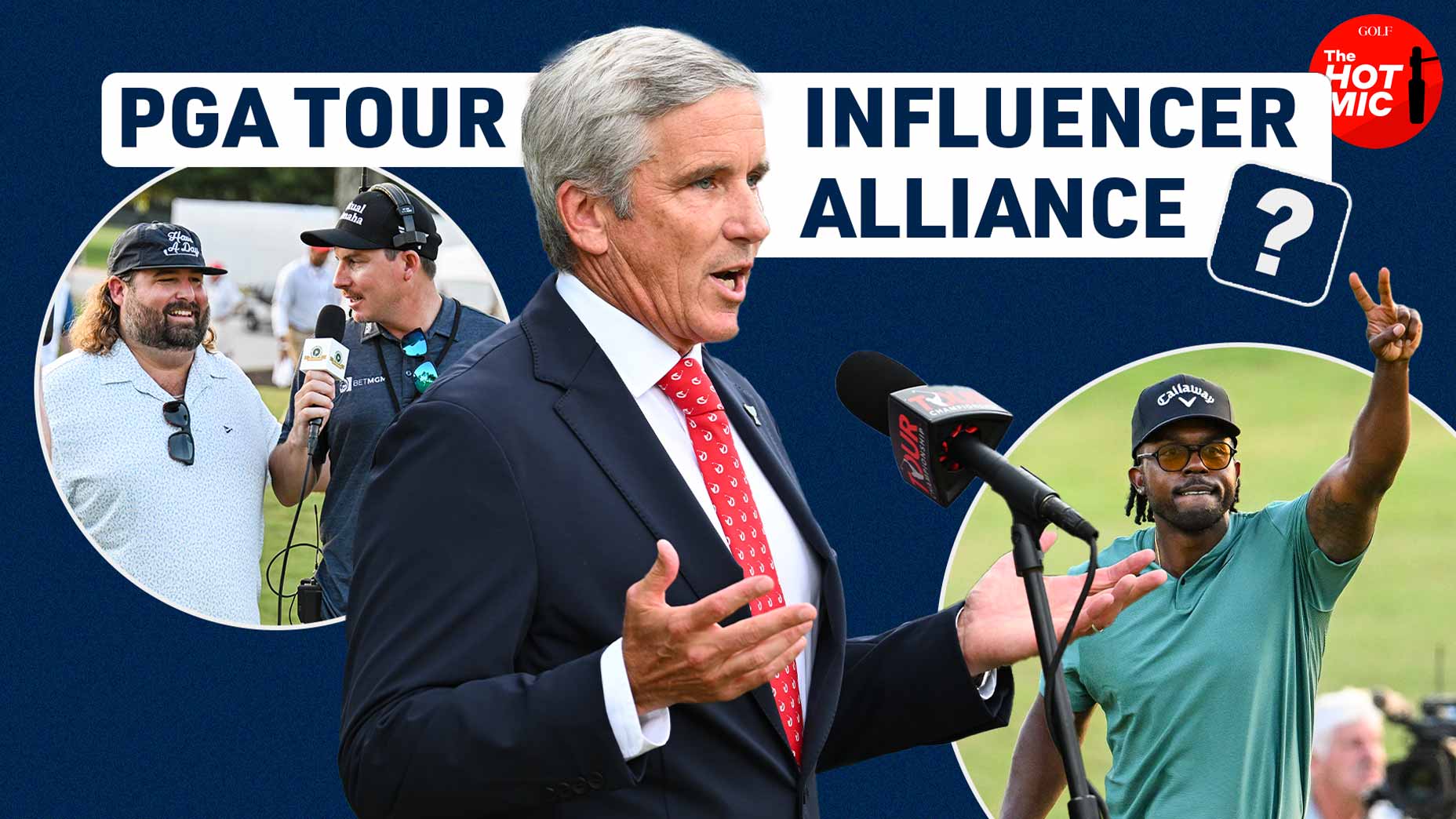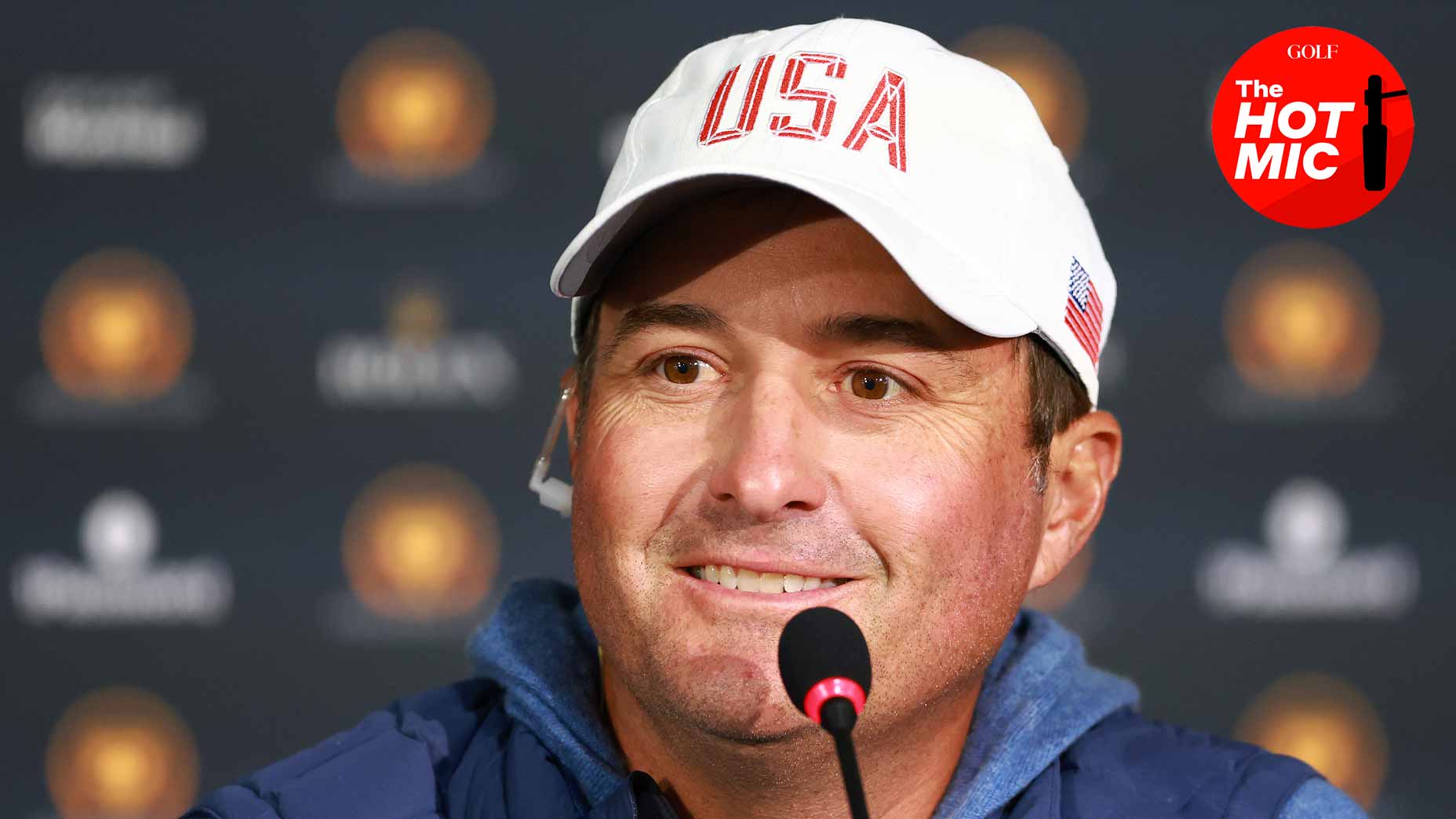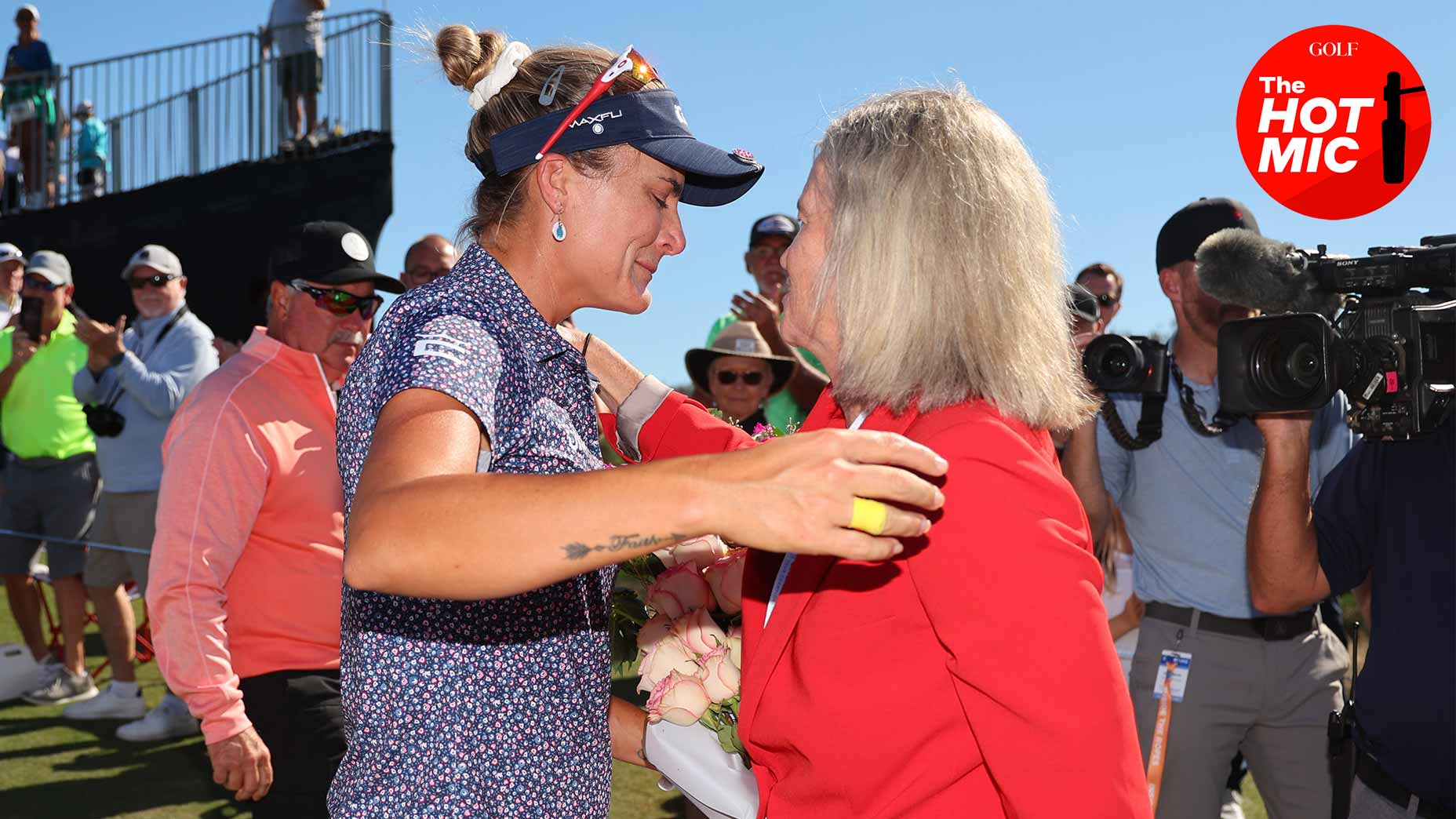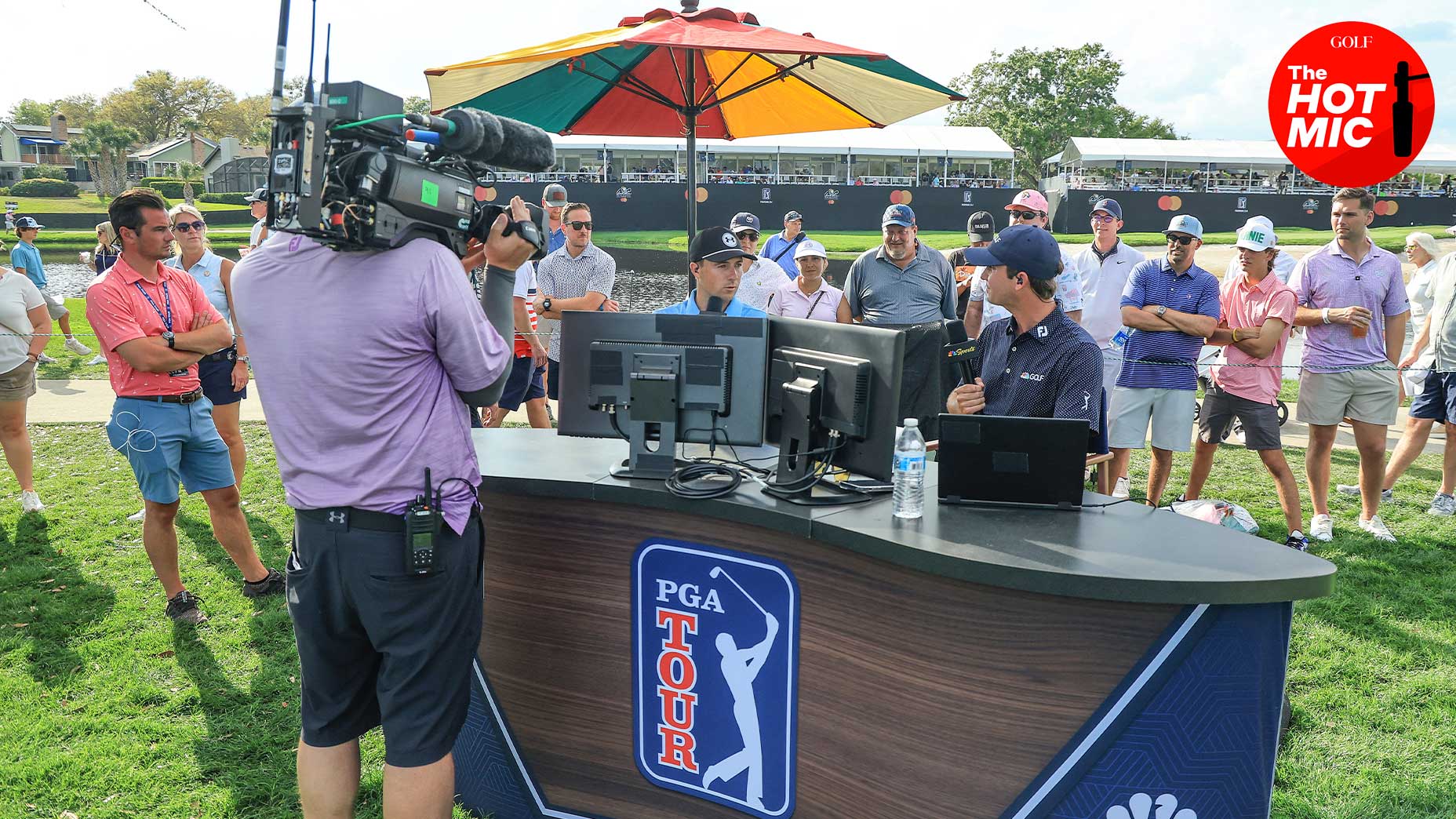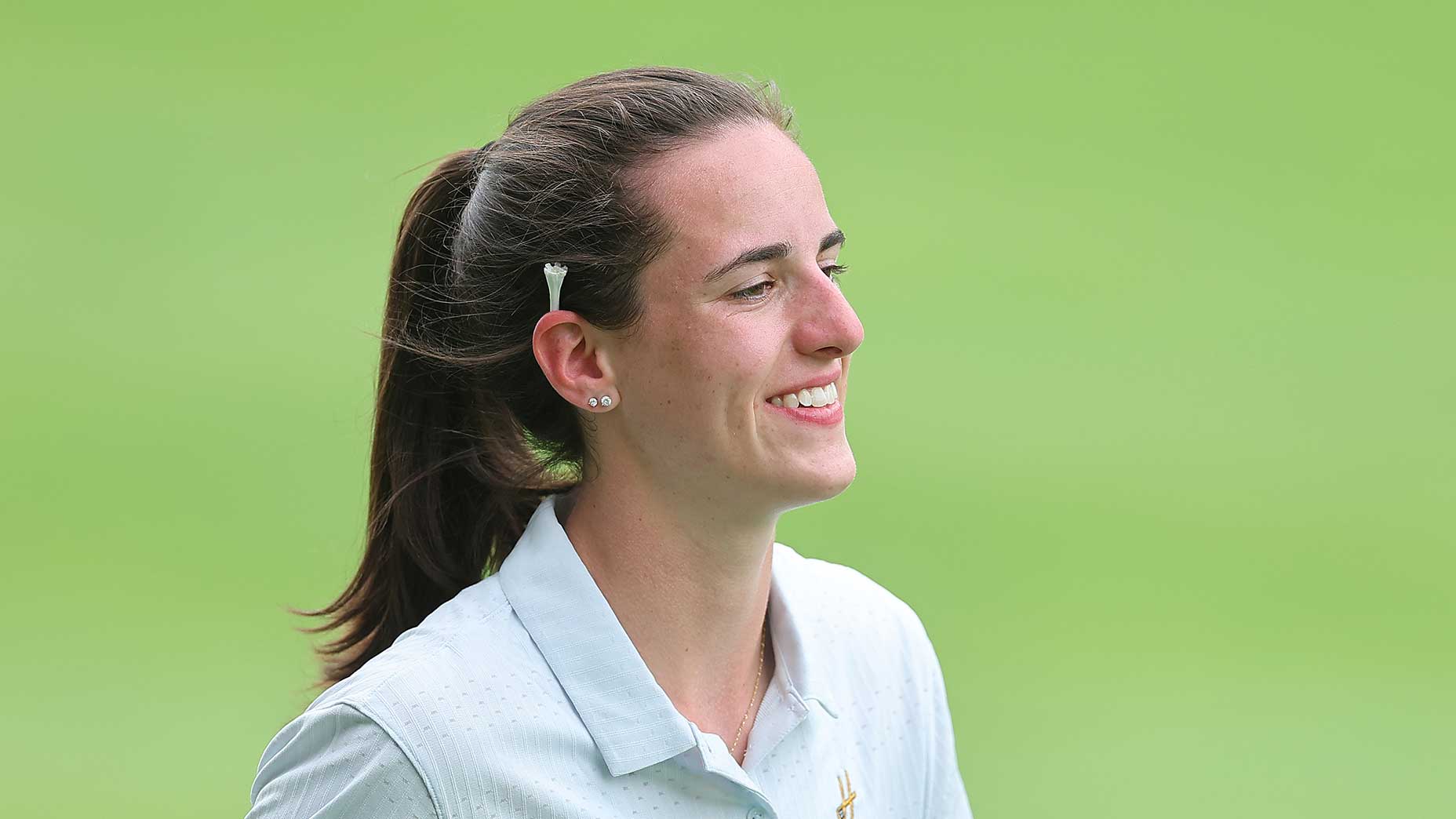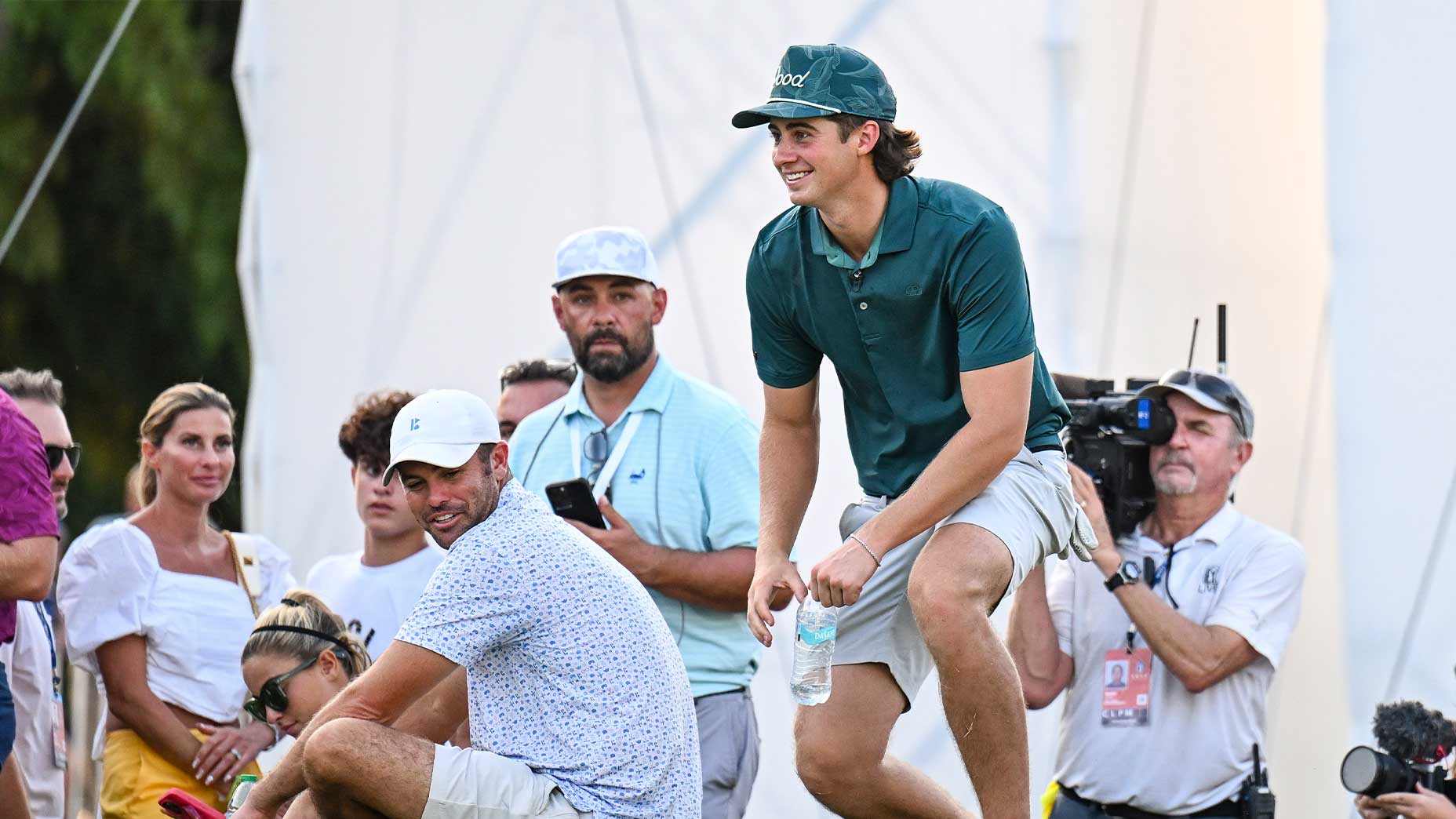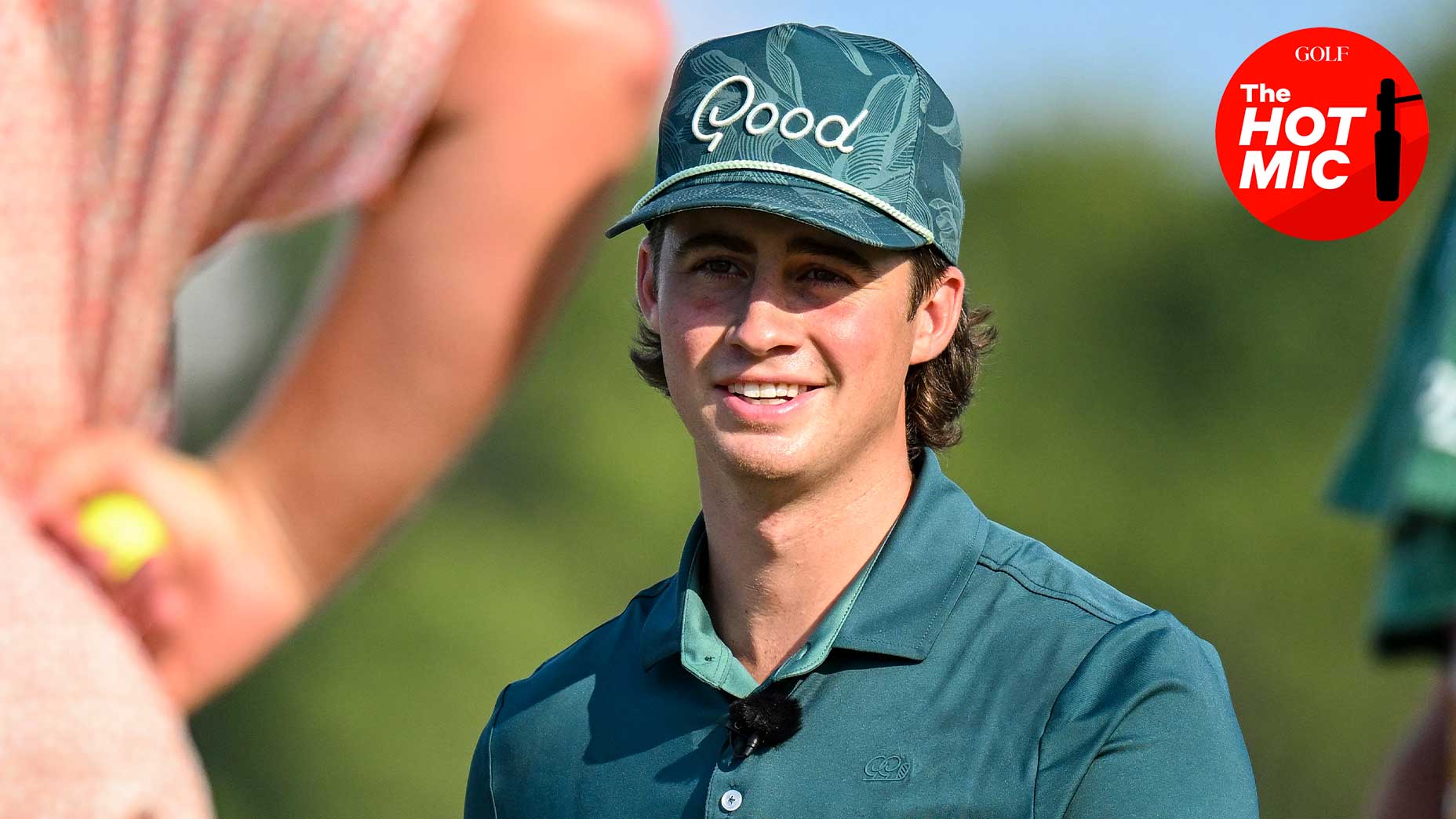At the Masters, a departing CBS legend shares secrets of the past
- Share on Facebook
- Share on Twitter
- Share by Email
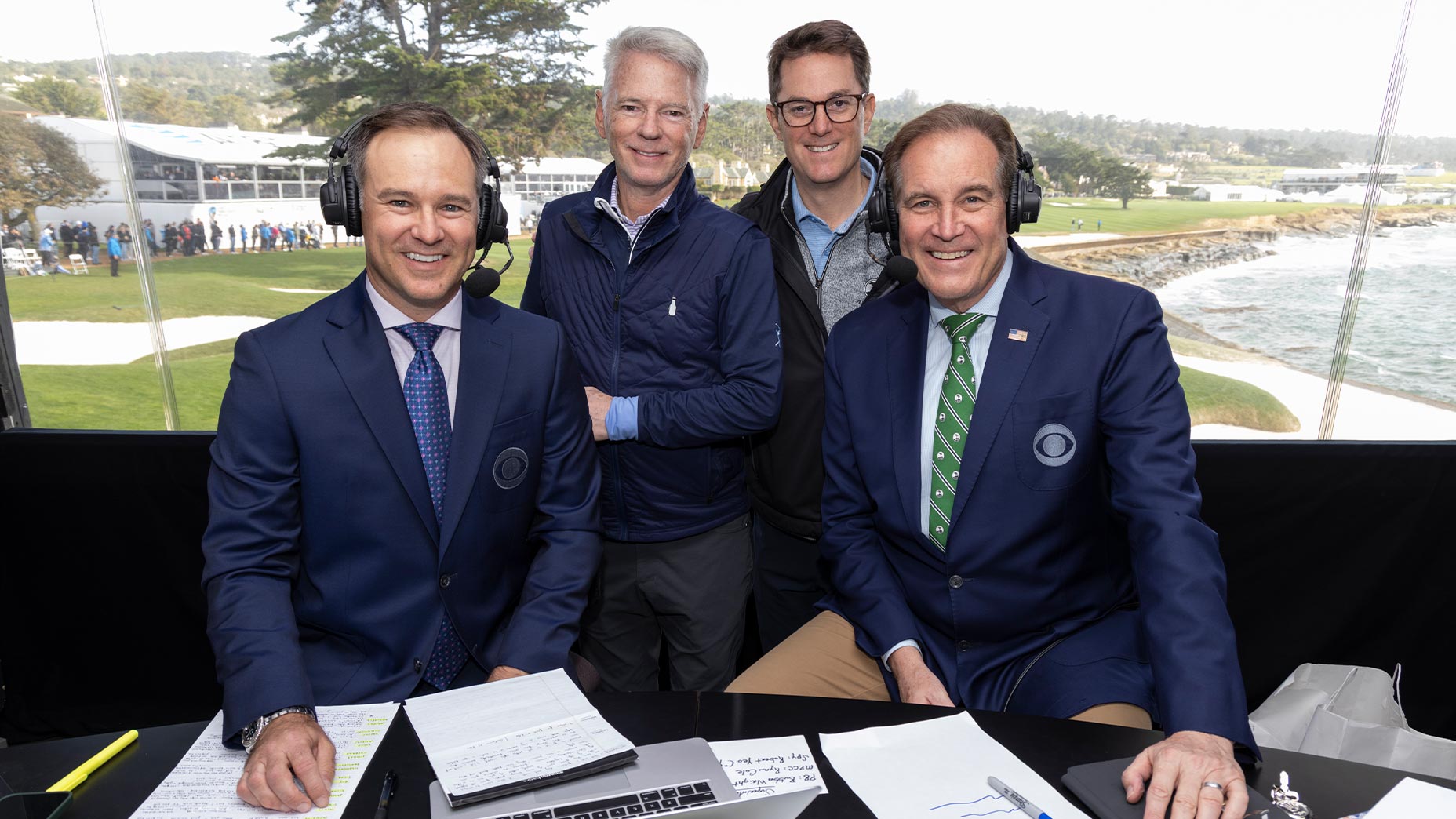
CBS Sports chairman Sean McManus (back left) prepares for his swan song at the Masters.
Richard Green/CBS Sports
THE DESK in Sean McManus’ Manhattan office stares inward.
A tremendous skyline towers from just beyond the windows of the 19th floor of the CBS Sports building in Midtown, where skyscrapers shoot from the earth at an oblong angle. On the afternoon we meet in March, a cloudy morning has given way to a warm and steady rainstorm, which is gently thrashing against the wall-to-ceiling windows directly to his rear, illuminating the surrounds in a gray mist.
Even on days as bleak as this one, it seems strange that a man with as much power as the three-decade chairman of CBS Sports would not, at the very least, like to gaze out upon the vastness of his domain. And we should probably remind you that this is McManus’ domain. Just not for much longer.
When McManus took over as CBS Sports president in 1996, the sports department was reeling. The network had lost its long-standing NFL rights and a sense of identity with them. Rumors swirled that they might be leaving the sports business altogether.
CBS Sports has a new CEO. Here’s what that means for golfBy: James Colgan
McManus was hired to restore order, and in 27 years as the big boss, he has turned “the Eye” into a monolith, overseeing CBS’s transition into becoming (at worst) one of the three most profitable sports networks in the most profitable era in sports television history. Every television set from here to Hoboken — and well beyond — has aired CBS, which means every viewer has been touched, in some small way, by McManus.
A few years ago, when CBS moved offices to their current location on 57th street, he took on a large corner unit, hung a few photos and faced his desk toward them.
It seems trivial to speak about matters of décor now. In a week, McManus’ interior design will no longer be the concern of his employer. The 69-year-old chairman of CBS Sports — and one of the most revered figures in modern sports television — will be riding off into what we hope is a slightly drier sunset in Augusta, Ga., retiring from the network officially at the completion of the Masters tournament.
But when asked about the changes we can expect from his successor and protégé David Berson, McManus usually begins with a joke.
“David plans to turn the desk around so he can look out the window.”
It’s been a long journey to Masters Sunday 2024 for McManus. But the journey is the interesting part, which is what has brought us (in more than a few ways) to his office with the big windows and the photos and the inward facing desk.
You see, many of those who enter the television business are seeking fame. And the overwhelming majority of those who reach McManus’ heights are in pursuit of fortune. But Sean McManus is different in that he needs neither.
And, as I’m about to learn, his desk tells the story of why.
IN HINDSIGHT, IT’S EASY TO SAY that Sean McManus was meant to be in sports television. He was literally born into it.
Sean McManus’ father was Jim McKay, the legendary ABC broadcaster and longtime host of Wide World of Sports, which meant that one of Sean’s first acts of sentience was picking his sports teams. Even from an early age, McManus and his father were inseparable. And, with his father working as the radio broadcaster for his beloved New York Giants in the 50s and 60s, McManus lived every kid’s dream, attending games from the comfort of the press box.
He fell hard for sports in those early years, and five decades in the underbelly haven’t jaded the memories. He gets a half-dozen names down the roster for the 1963 Giants before he stops himself.
“Anyway,” he says with a faint grin. “I could go on.”
Later, he recalls in vivid detail the moment that sports television changed his brain chemistry. It came at the 1967 Jacksonville Open, where Sean was hired for his first-ever TV job sweeping floors and cleaning ashtrays for the legendary producer Chuck Howard.
The big moment came on tournament Sunday, when the unit manager instructed him to stop by the pay line. He was handed $25 for the week “in a little yellow envelope” — his first paycheck in sports TV. He was 12 years old.
Most tellings of the story end with “and I never looked back.” But the truth, he tells me, isn’t quite as simple. He enjoyed a stretch of youthful rebellion, and even considered striking away from the family business. He spent one of his summers at Duke as an intern at the high-powered investment bank Salomon Brothers, who offered him a job dangling a $1 million salary by the age of 30.
“I enjoyed it,” he says. “I thought it was fun. I remember telling my mother that I thought I could make a lot of money on Wall Street.”
But something wasn’t right.
“I missed the energy of live sports,” he says. “I said, ‘If I can get paid to do this, then this is what I’m going to do.'”
EVENTUALLY, MCMANUS grew out of the production truck.
After roles as a producer at ABC and NBC in his twenties, the corporate life came calling. Soon his day-to-day focused more on the commercials and less on the time between them.
But he couldn’t shake his producer’s disposition. His personality is practically hard-wired for television work: no-nonsense, quick to the point and perhaps even a little brusque. His brain always seems to be probing, and even when he’s animated his sentences have a habit of sounding coldly analytical.
“The problem is that TV is a very subjective medium,” he says at one point — and I can’t help but notice that this seems to disappoint him.
Objective good might not exist in sports TV, but that hasn’t stopped McManus from trying to find it. Over the years, he’s invested considerable network resources and tremendous amounts of his personal time thinking about how CBS’s product can be strengthened, sharpened and honed. He practically lives in the production truck during the big events, sitting behind his lead producer and watching the show unfold in real-time.
“Is it hard for you to keep your mouth shut?” I ask, noting the intense communication hierarchy in live sports production.
8 noticeable changes coming to CBS Golf broadcasts in 2024By: James Colgan
“Well, no,” he says with a smile. “Because I don’t keep my mouth shut.”
The benefit of sitting in the truck, he explains, is that he can offer live feedback. The suggestions are usually small and almost always editorial, like a graphics package he thinks could be useful or a player who hasn’t been shown in too long.
“The funniest thing happens,” Sean says, still smiling. “When I make a suggestion, I find that the producers listen to me.”
If that makes him sound like a control freak, so be it. His producers are wired the exact same way, and they don’t mind having a boss who understands the product is as important as the money it makes.
“I’m constantly nervous that we’re gonna miss something, or we’re gonna lose the camera for technical reasons,” he says. “I’m a total and complete nervous wreck, especially if it’s a high-profile event like the Masters. I’m totally nervous until we sign off.”
He gets over it by scurrying about like a pillbug, darting around so many corners of the property that his coworkers are amazed he’s standing upright by Sunday. (“It’s like there’s 10 of him,” Jim Nantz says.)
His employees get over it because they know Sean is the first one in their corner, a point nearly every member of the CBS team raises to me.
“A lot of people look at our little world of golf as some kind of niche thing,” Nantz tells me. “Sean is a leader of a giant division at a major network has all these things that he’s responsible for, and yet he treated golf like it was bigger than anything. Talent decisions, personnel, technology — all it ever took was a single phone call. Golf was absolutely a part of his lifeblood.”
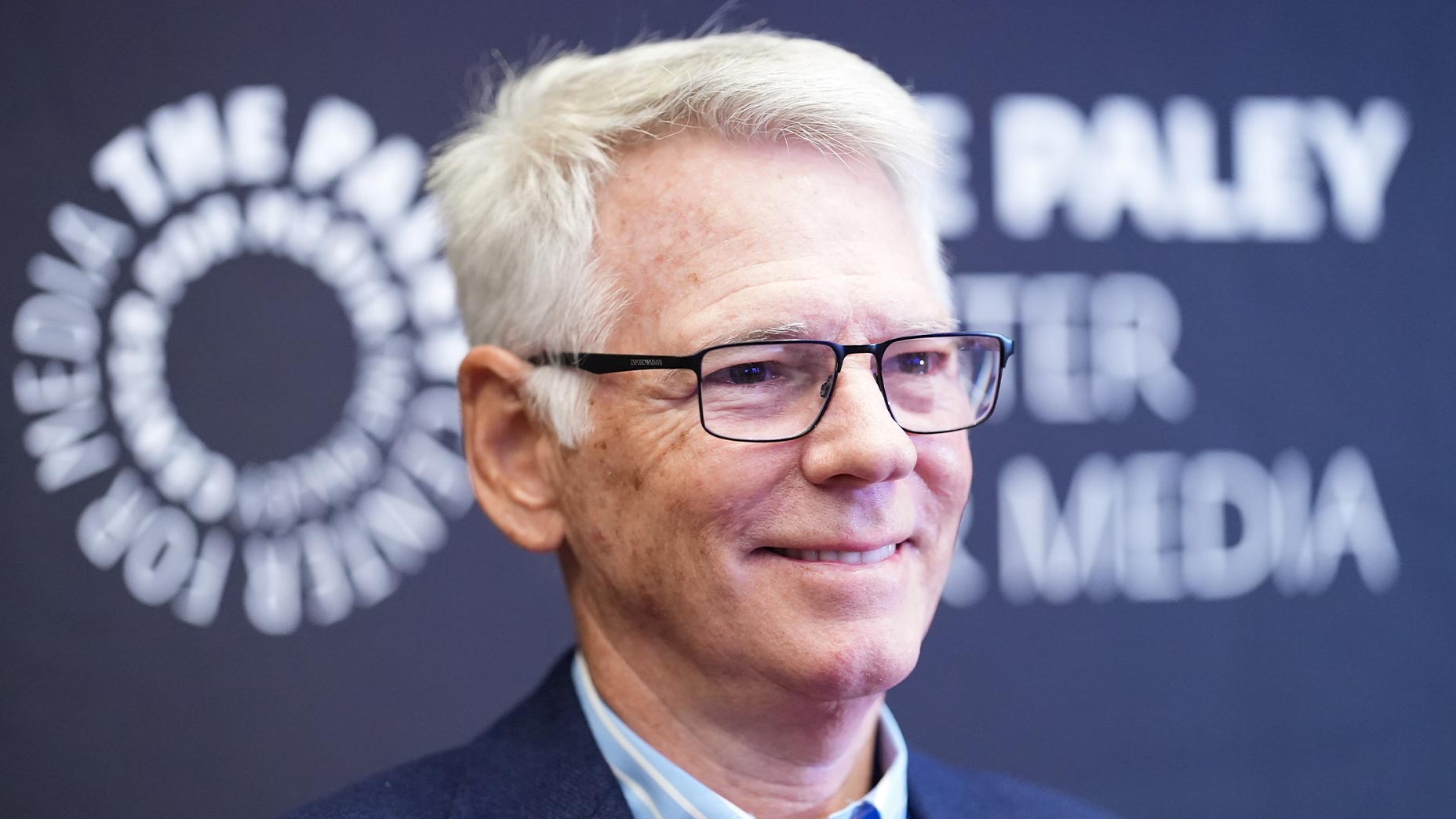
“When you look to your left and your right, you see that you have people you’ve been covering golf with for 25, 30 years,” lead producer Sellers Shy agrees. “Sean was the one who allowed this family to form. I’m immensely grateful for that.”
Investment goes further than just production bells and whistles. McManus deserves credit for identifying broadcast talent across the CBS suite, like Shy, who’s been a massive piece in the network’s reinvigorated golf coverage.
“You listen … a lot,” McManus says of his talent acquisition strategy. “You want people who are animated and articulate.”
Similar praise could be shared for McManus’ biggest recent hire: Trevor Immelman, who’s dazzling first two years in the lead analyst chair for Nick Faldo have placed him on what McManus says is a historic trajectory.
“When it’s all said and done, I think Trevor is going to be remembered as the best golf analyst ever to do it,” McManus says. “I really believe that.”
There’s a certain satisfaction in his voice as he says this. You see, for Sean McManus, legacy is a very big word.
THE MASTERS WAS ALWAYS going to be the end. When McManus quietly formalized his retirement plan with the CBS board in the summer of 2022, he specified that he hoped to remain in his post through the second Sunday in April, 2024.
The Masters would mark the end of the CBS “super season,” allowing McManus the opportunity to rip through one last Super Bowl, Final Four and Masters in three months. The schedule would also give his eventual successor (his hand-picked protégé, David Berson) the summer to get up to speed before the NFL season began.
The timing made sense for a proper CBS ending, but strangely, the decision to finish in Augusta had much more to do with the beginning.
“Do you have a favorite Masters memory?” I ask as our conversation winds down.
“I’ve got four of them,” he tells me. “Tiger in ’97, my first Masters with CBS. Tiger in ’19, the comeback. Jack in ’86 — which has to be one of the five greatest golf tournaments ever…”
“And then I have a fourth … I’m not sure I actually remember this, but I think I’ve convinced myself that I do,” he says. “It was Arnie in 1960 … my dad made the winning call.”
He pauses a bit as he says that last part, and we both know why. Palmer’s victory in ’60 was the last Masters call Jim McKay ever made. He left the tournament on his own terms the following year to start Wide World of Sports, which is where the overlaps between Sean and his father’s careers end.
On a rainy Saturday in June 2008, almost two months to the day after Immelman’s Masters win, Jim McKay died. Sean’s hero and best friend was gone.
McKay’s legacy has many parts, but like a lot of parents, he believed the easiest way to summarize it was his son: the sportscaster’s kid who became the head honcho. Once, early in his CBS tenure, Sean pulled off a remarkable upset by wrangling back CBS’s NFL rights. He called home to find his father crying tears of pride.
A few hours after the final putt drops each April, Sean takes a break from the sprint around Augusta National to spend a few minutes alone at Amen Corner. Any guess who he’s talking to?
“He’s probably tired of me bugging him,” he says, grinning.
This, it turns out, is the fire that fuels Sean McManus. Not the pursuit of fame nor the chance to make a lot of money. But a legacy of a much simpler variety: a son trying to strengthen his son.
As I go to leave his office, past the windows and the inward-facing desk, McManus stops me.
“Did you see those?” He asks, pointing toward the office’s aft side.
On a wall filled with memorabilia — the wall McManus stares at every single day, and the wall that would be barren and mostly unseen if McManus faced his desk in the opposite direction — there are two large frames. Pictured are the two stars that have made McManus’ legacy as CBS Sports Chairman, a legacy that has been in the works much longer than anyone realizes.
“Tiger Woods and Patrick Mahomes,” McManus says. “They’ve been good to me.”
He grins again.
“I like to keep them close by,” he says. “A good reminder of what’s important.”
Much closer, in a smaller photograph just to his right, his dad smiles back.
To receive exclusive golf media updates like this one from me, James Colgan, click the link here or the tab below to subscribe to the Hot Mic newsletter.

Latest In News

James Colgan
Golf.com Editor
James Colgan is a news and features editor at GOLF, writing stories for the website and magazine. He manages the Hot Mic, GOLF’s media vertical, and utilizes his on-camera experience across the brand’s platforms. Prior to joining GOLF, James graduated from Syracuse University, during which time he was a caddie scholarship recipient (and astute looper) on Long Island, where he is from. He can be reached at james.colgan@golf.com.
